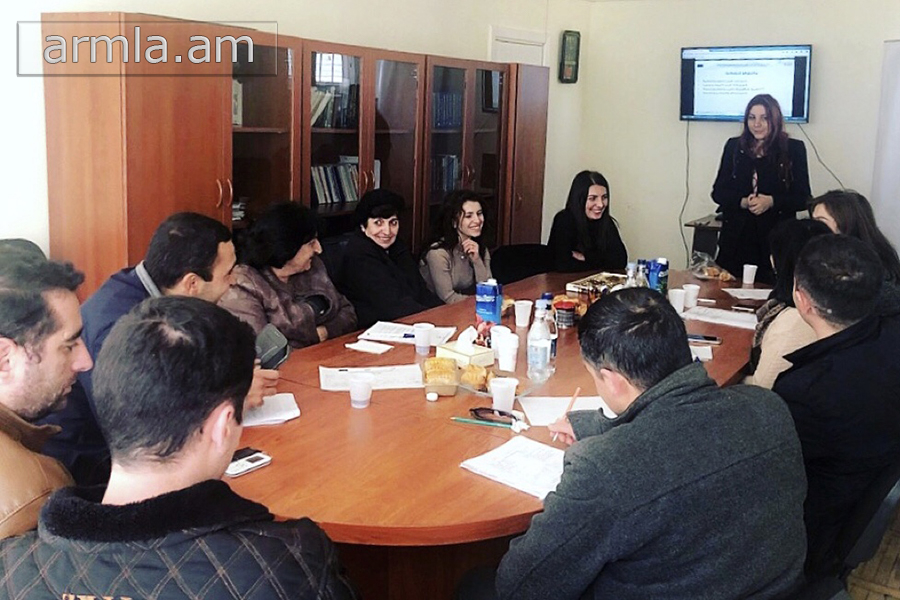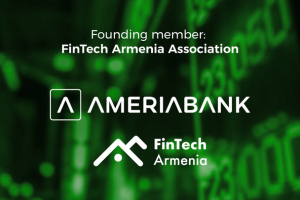Today, on 16th of November, 2018, the workshop on the “Introduction of the institute of beneficial ownership in RA” took place in Gavar in the framework of the Eastern Partnership Civil Society Fellowship. The workshop has been conducted by Mariam Zadoyan, an Eastern Partnership Civil Society Fellow and the “Introduction of the institute of beneficial ownership in RA with the aim of combatting corruption” project, Program Manager.
Business support organizations and businesses, youth organizations and other CSOs have participated in the event, including “Territorial Business Centre” NGO, BLEJAN” Environmental, Social and Business Support NGO, “Free Fly” Foundation for Socio-Economic Development, Jinishian Memorial foundation, Gavar civil youth center and etc.
The workshop started with the presentation of the “Eastern Partnership Civil Society Fellowships” Program. Mariam told that each year 20 follows from 6 EaP countries (Armenia, Azerbaijan, Belarus, Georgia, Moldova and Ukraine) are being selected based on their track-record of achievements to date and the strong potential they demonstrated in their proposals to act as champions of change in the civic sphere. In response to participants’ questions, Mariam encouraged all the young participants to apply mentioning. “Fellows’ profiles are quite diverse ranging from cultural managers to young lawyers and programmers with civic interest.”
The next part was the core of the training. The fellow explained that the beneficial owner is the individual or individuals who effectively owns or controls a legal vehicle. This ownership or control can be exercised in a variety of ways: for example, holding a controlling ownership interest (e.g. 25 per cent or more) of a legal person. Other ways include control of a significant percentage of voting rights, or the ability to name or remove the members of an entity’s board of directors. Participants started to ask question “Why is it important to identify the beneficial owner”. Mariam answered to the question in the following way “Anonymity enables many illegal activities to take place hidden from law enforcement authorities, such as tax evasion, corruption, money laundering, and financing of terrorism. That’s why it is important to know the the beneficial owner s of legal entities and arrangements to prevent the mentioned offences”
The expert made participants familiar with Armenia’s already existing legal rules on the concept, mainly banking, mining and public procurement legislation. Afterwards, Mariam presented the main deliverables of the lobbying activities under this fellowship that she managed to achieve with the assistance of the CSO’s Anti-Corruption Coalition of Armenia. The latter include foreseeing a clause on the concept in RA Government Strategy for 2018, in the report on “Anti-corruption reforms in Armenia” of the 4th round of monitoring of the Istanbul Anti-Corruption Action Plan carried out in the frameworks of Anti-Corruption Network (ACN) of the Organization of Europe on Cooperation and Development (OECD) and the Open Government Partnership (OGP) 4th National Action Plan. The ACN network mainly supports the countries of Eastern Europe and Central Asia in their efforts to prevent and fight corruption. The OGP is an organization of reformers inside and outside of government, working to transform how government serves its citizens.
The fellow also talked about a wide range of issues that would be raised during the establishment of such a register in Armenia. The most heated debate concerned the sanctions. Mariam spoke about international practices. Penalties can be imposed for non-compliance, including criminal sanctions or a management ban on individuals who fail to file or file inaccurate information about the beneficial ownerships. Some participants shared the viewpoint that the sanctions should only have economic character, mainly be realized through fines, even heavy ones. Other participants expressed views that in cases of systemic non-compliance with the rules by companies managed by oligarchs even more strict sanctions should be applied, including the dissolution of companies. At the end of workshop, reception has been foreseen.
The article is prepared in the frameworks of the project “Introduction of the institute of beneficial ownership in RA with the aim of combatting corruption” implemented under an Eastern Partnership Civil Society Fellowship provided by EU financed “Eastern Partnership Civil Society Facility” Project, carried out by a consortium headed by GDSI Limited.
The content of the article is the sole responsibility of the author, and neither the European Union nor the implementing consortium of the “Eastern Partnership Civil Society Facility” do not bear any responsibility for it.
Zakar Iskandaryan,
Mariam Zadoyan
















